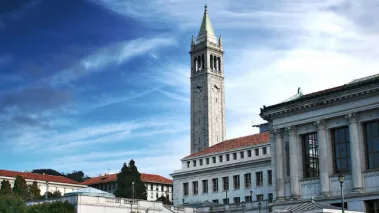Table of Contents
Bill Maher Delivers Commencement Speech Without Censorship

Bill Maher spoke at the University of California, Berkeley’s winter graduation ceremony on Saturday following months of demands that the university disinvite Maher because of his controversial statements about Islam. Thankfully, the UC Berkeley administration steadfastly resisted those demands, even releasing statements explaining why the university’s commitment to freedom of expression required it to allow Maher to speak.
According to the San Jose Mercury News, a group of protesters demonstrated outside the venue before the ceremony and later held up signs during Maher’s speech, but they remained silent while he was speaking. Meanwhile, Maher took the opportunity to urge each of the audience members to “be a free thinker” and to “own the First Amendment.”
Maher wasn’t the only one advocating for First Amendment principles. After meeting with approximately 20 students last Wednesday regarding the plans for Maher to speak, UC Berkeley Chancellor Nicholas Dirks sent them a letter sympathizing with their personal objections but making legal, moral, and practical arguments against censorship. Dirks wrote:
Free speech is a basic right and is not only constitutionally protected but also a value that is encoded in the DNA of Berkeley. And yet the current controversy makes clear the extent to which free speech can cause pain, offense, and even outrage. Our history – as a campus, as a community, and indeed as a nation – makes clear this is an inevitable effect of free speech, and it is a fact that courts have invariably stricken efforts to legislate limits on free speech that may be judged as offensive or even intentionally hateful. …
While I recognize and agree with some of the concerns that have been expressed, any effort to constrain or limit the conditions around invitations to speak – whether at commencements or other public event – risks compromising the fundamental values that free speech protects. Who can speak freely? Which opinions might be justly censored? What criteria can be imposed neutrally and fairly? Who judges? How can feelings of offense, or hurt, constitute legitimate grounds for limits not just on speech but on invitations to speak on campus? Surely a university – especially this university — has an obligation to promote speech, opinion, and argument at its most robust.
FIRE is glad to see Dirks take such a strong position in favor of free speech—we only wish the message had also been directed at those who disrupted a presentation by Peter Thiel at UC Berkeley earlier this month. But now that both George Will (at Michigan State University) and Bill Maher have managed to speak to graduating classes without major incident, perhaps students will recognize that they can make their voices heard without silencing others.
Recent Articles
FIRE’s award-winning Newsdesk covers the free speech news you need to stay informed.

FIRE statement on immigration judge’s ruling that deportation of Mahmoud Khalil can proceed

FIRE welcomes Allison Hayward to board of directors

‘Executive Watch’: The breadth and depth of the Trump administration’s threat to the First Amendment — First Amendment News 465
